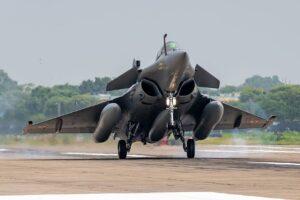The Rafale was first deployed in a major capacity during ‘Operation Sindoor’ in early May against Pakistani forces, where it is said to have played a key role in conducting long-range precision strikes.

The Rafale, developed by Dassault Aviation, is a twin-engine, multirole fighter aircraft that has become a crucial asset in India’s effort to modernise its capabilities. (Wikimedia Commons)
Synopsis: Tata Advanced Systems Limited and France’s Dassault Aviation have signed four agreements to manufacture complete Rafale fighter jet fuselages in India, with a new facility to be established in Hyderabad. This marks the first time key components of the Rafale will be built outside France, and it is being hailed as a major step forward in India’s defence manufacturing and indigenisation goals.
In a significant step towards India’s defence manufacturing ambitions, Tata Advanced Systems Limited (TASL) and France’s Dassault Aviation have signed four production transfer agreements to build complete fuselages of the Rafale fighter aircraft in India.
This marks the first time that key components of the flagship French multirole combat aircraft will be produced outside France. The project is being hailed as a major boost for India’s aerospace capabilities and defence sector indigenisation efforts.
Furthermore, TASL, a wholly owned subsidiary of Tata Sons, announced on Thursday, 5 June, that it will establish a high-precision, state-of-the-art manufacturing facility in Hyderabad for this purpose.
The Hyderabad plant will produce major structural parts of the Rafale fighter jet, including the lateral shells of the rear fuselage, the complete rear section, the central fuselage, and the front section.
The first fuselages are expected to roll out by the financial year 2028. Once fully operational, the facility will aim to produce up to two complete fuselages per month.
“This is a decisive step in strengthening our supply chain in India,” said Eric Trappier, Chairman and CEO of Dassault Aviation.
Sukaran Singh, CEO and Managing Director of TASL, highlighted the broader significance of the collaboration:
“It reflects the remarkable progress India has made in establishing a modern, robust aerospace manufacturing ecosystem.”
Also Read: ‘Were able to understand tactical mistake we made’: India acknowledges jet loss in Operation Sindoor
Strengthening Indo-French defence ties
The Rafale, developed by Dassault Aviation, is a twin-engine, multirole fighter aircraft that has become a crucial asset in India’s effort to modernise the Air Force, moving away from the antiquated Russian-made MiG and Sukhoi platforms.
India signed a €7.8 billion agreement with France in 2016 for 36 Rafale jets in fly-away condition. All aircraft were delivered by April 2022.

A Rafale landing at Ambala Air Force Station on its first arrival in India on 29 July 2020. (Wikimedia Commons)
An intergovernmental agreement was further signed in April 2025 for the procurement of 26 Rafale M jets for the Indian Navy. Deliveries for these aircraft are expected to begin in 2028.
The Rafale was first deployed in a major capacity during ‘Operation Sindoor’ in early May against Pakistani forces, where it is said to have played a key role in conducting long-range precision strikes.
Launched from within Indian airspace, the strikes were reportedly targeted at ‘terror infrastructure’ within Pakistan and Pak-occupied Kashmir.
At least one Rafale was confirmed to have been shot down during aerial engagements, according to India’s Chief of Defence Staff, General Anil Chauhan.
Pakistan, which fielded Chinese-made J-10C fighters armed with PL-15 long-range air-to-air missiles, claimed to have downed up to three Rafales.
(Edited by Dese Gowda with inputs from Sumit Jha)










